These Neem Oil Uses for Garden are perfect if you’re an organic gardener. It’s the safest, easiest, and effective way to replace harmful pesticides!
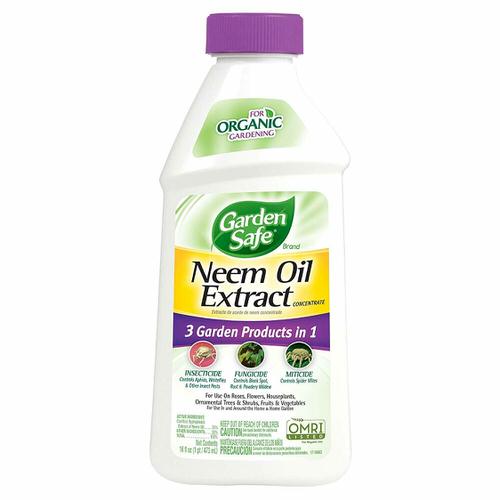
Unlike commercial pesticides, neem oil is entirely safe and natural, absolutely free from harmful chemicals. Also, it’s more effective than any other organic pest repellent available. Here are the best Neem Oil Uses for the garden!
Have a look at the best cinnamon uses in the garden here
What is Neem Oil?
If you are into organic gardening, you must know about Neem oil uses in the garden. Neem oil is a natural pesticide derived from the Neem Tree seeds. A great medicinal tree found in the Indian subcontinent is also known as the Wonder tree.
The main insecticidal ingredient of Neem oil is Azadirachtin, and it’s non-toxic to mammals, as proven in studies. Unlike chemical pesticides, it’s not carcinogenic. Also, it is anti-cancerous. Moreover, many scientific studies are going on to understand its positive effect on cancer.
How is Neem Oil So Effective in Killing Pests?
Neem oil is the most potent naturally occurring pesticide. It works by interfering with insects’ hormone systems, making it impossible for them to grow further and lay eggs. Other components in neem oil hinder the insects’ ability to feed, which kills them after some time.
Neem Oil Uses for Garden
1. Neem Oil to Kill Pests
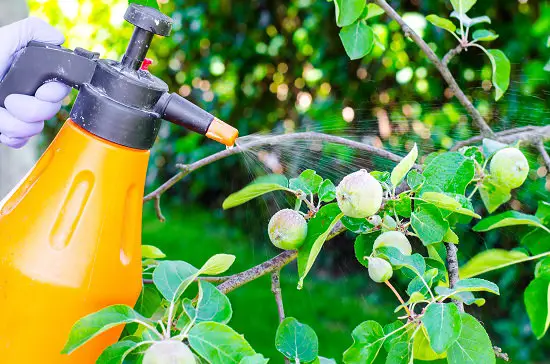
If you face problems with garden insects, then neem oil is the solution. As it is natural and completely safe for plants and pets, you can use it as an organic insecticide.
Neem oil is beneficial against more than 200 species of insects, including most common pests like aphids, whiteflies, thrips, mites, and leafminers. The extensive list is available here.
2. Control Nematodes
Nematodes are known to wreak havoc in the garden, especially the Root-knot ones. Interestingly, they’re responsible for 5 percent crop loss globally!
Spraying diluted Neem oil over the leaves and around the base of plants is one of the most effective ways to stop them from spreading, as it effectively finishes the Nematodes larvae, preventing them from hatching.
Its potency is proven in a study published in the plant pathology journal here.
3. Keep Slugs Away
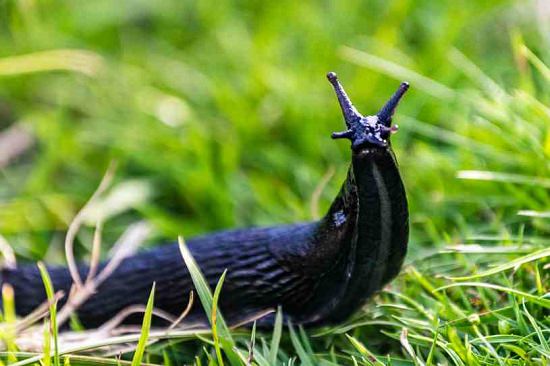
Slugs are notorious garden pests. They nibble a plant’s leaves to the extent it dies. Neem oil is like poison to pesky snails and slugs and helps keep them away once applied.
Using a spray bottle, spray the plants with a neem oil mix. Check out this critical study to learn more here.
Get the best slug prevention tips here
4. Prevent Fungal Diseases
Plants are prone to fungal diseases, and they’re responsible for damage to their foliage, fruits, flowers, and overall growth. Neem oil works best for black spots, anthracnose, scab, rust, leaf spots, and tip blight.
Spraying neem oil solution over plants keeps the fungal infections at bay, as it kills the fungi and stops them from spreading to other plants, as stated in the Nigerian study here!
5. Use it as a Mosquito Repellent
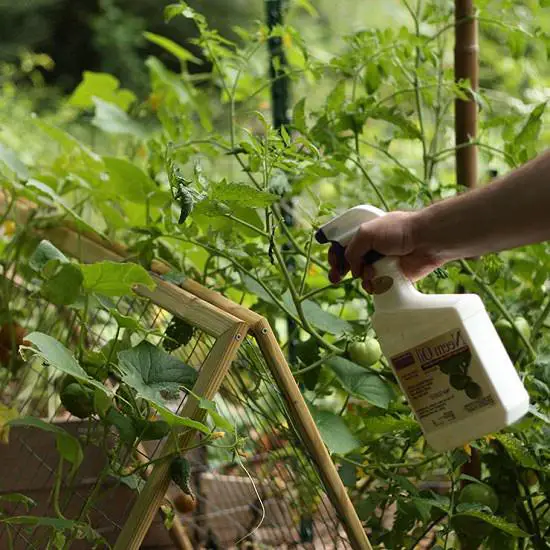
Gardens act as a perfect place to harbor the mosquitoes. Spraying neem oil at strategic locations repels the mosquitoes. You can also apply the neem oil to your skin, as it’s organic and safe.
Mix 2 ml of neem essential oil in 100 ml coconut or other carrier oil and apply it to your exposed skin. This will provide you protection from mosquitoes for 3 hours. Here are the research details.
Check out some brilliant DIY mosquito repellent ideas here
6. Prevent Rust Diseases
There are over 5000 species of rust that harm an extensive list of plants. Spraying neem oil over the affected plants prevents the leaves from developing rust spots and saves the plant from several other diseases.
You can also use other essential oils like tea tree, thyme, clove, etc., for this purpose.
7. Control Lawn Grubs
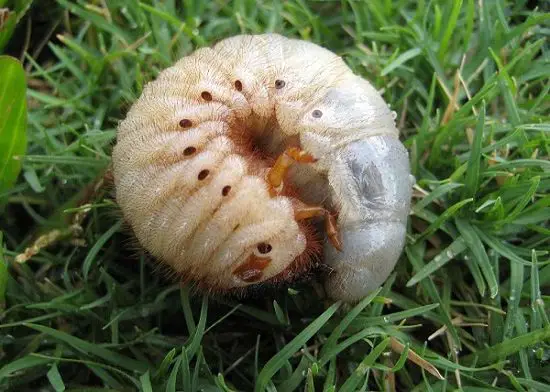
Lawn grubs can be very harmful to your lawn as they tunnel under the soil and cause damage to the roots of grass and other plants.
Spraying Neem oil on the lawn and around the roots of the plants is one of the most effective ways to control Japanese beetles, stopping them from laying eggs that later become larvae (Lawn Grubs).
8. Protect Fruits and Berries
If you have fruits and berry trees in your garden, then Neem oil is the best way to protect them from fruit flies and other nuisances. Spray the plants with diluted neem oil before they blossom and again when the fruits appear.
This will ensure that pests like fruit flies, leafhoppers, and aphids, stay away.
9. Pests Never Become Resistant to it
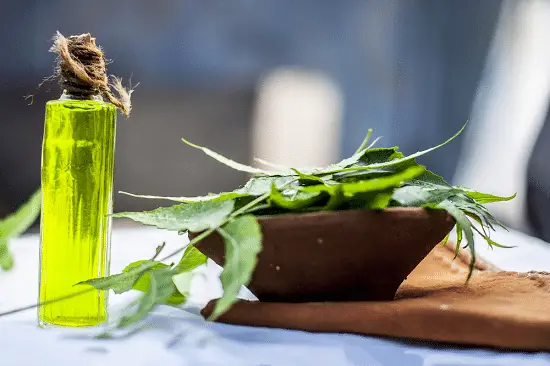
Even after repeated applications of neem oil in the garden, it will be as effective on pests as it was on the first day. Insects and pests never become immune to the Neem oil, meaning it’s always effective against them.
Check out a good read here, which elaborates this claim more.
10. Act as a Foliar Spray
Neem oil could help kill insects at different stages, and you can safely use it as an application for the dormant season and kill overwintering bugs, eggs, and pests. It can also be used as a foliar spray to eliminate bugs and kill them.
The dormant neem oil spray can kill insects like aphids, mites, tent caterpillars, scale insects, and whiteflies.
11. Not Harmful to Pollinators
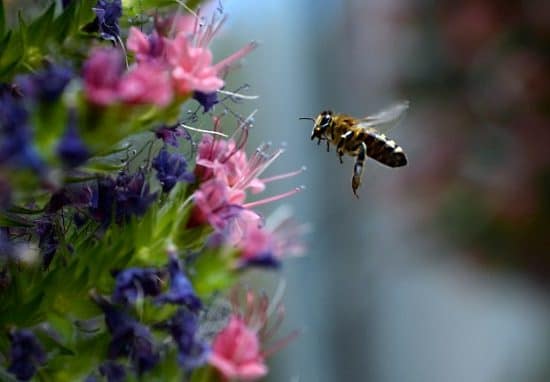
As we all know, pollinators like bees are becoming increasingly rare due to climate change. And to make matters worse, synthetic pesticides are also responsible for their deaths. Using neem oil as a pesticide won’t harm bees, dragonflies, and butterflies, as they do not feed sap of the leaves.
Neem oil never makes its way to the flower’s nectar, keeping the bees and butterflies safe! This way, you will also be playing an essential role in conserving the environment.
12. Great Bactericide
Neem oil is also capable of fighting fire blight, a disease caused by bacteria, and it makes the leaves wiry and gives them a burnt look.
To stop this from happening, you can spray neem oil while they are in the dormant season because mainly the responsible bacteria for fire blight overwinter on twigs, trunks, and branches of trees.
13. Not Harmful for Beneficial Earthworms
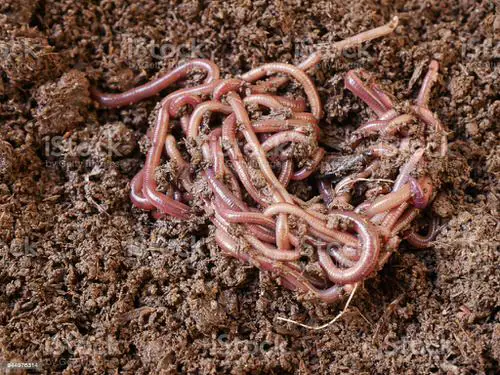
It is known that traditional pesticides loaded with chemicals can also kill earthworms, but neem oil does the opposite as it boosts earthworm activity, this is why the use of neem cake in soil amendments is increasing.
All gardeners know how beneficial are the earthworms to the garden soil with their potential to dig up tunnels throughout, making the medium air-circulated and loose.
Learn how earthworms help improve soil quality here
14. It’s Completely Biodegradable
Neem oil is a biodegradable compound derived from the neem tree and breaks down quite quickly. Most products are made up of water, neem oil, and some solvent or surfactant to help the water and oil mix well.
15. Greenhouse-Safe

The aphids, mites, scales, bugs, and whiteflies find the greenhouse to be a perfect place to colonize, which you can stop by spraying neem oil.
16. Keeps Ticks Away
Neem oil is also quite potent when keeping the ticks away, especially from your pets. Dilute it in the ratio of 1:1 with coconut or jojoba oil, soak a cotton ball, and apply it where you spot ticks on your pets.
As neem oil’s topical application is non-toxic for dogs and livestock, you can use it while washing their coat. However, consult a vet or search online thoroughly to learn about the exact application, benefits, and possible side effects.
Check out the best ways to get rid of ticks here
17. Prevents Mosquito Larvae
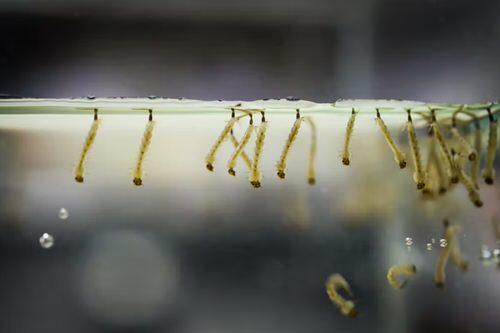
If you want to control the population of mosquitoes in the most environment-friendly way, mix a few drops of neem oil in water and spray on the surface where you spot the larvae, and it will kill them in no time.
You can also drop a few droplets of neem oil in the pond or container water garden to get rid of mosquito larvae.
Here are the best ways to control mosquito larvae
18. Repel Cockroaches
Cockroaches can be quite a nuisance in the house, and they are often hard to get rid of. Thankfully, you can eliminate them using neem oil. Put a few cotton balls soaked in neem oil where you spot them, and they will stop coming to the area due to its smell.
Neem oil also breaks down the outer muscular layer of the cockroaches, so they avoid coming in contact with it.
19. Prevents Lawn Grubs

If you don’t want a sprawling lawn to go into ruins, it is essential to take care of the lawn grubs, the larval stage of Japanese beetles. If unattended, they can wreak havoc on the garden and other plants.
To control them, mix equal parts of neem oil and liquid soap in water and spray it where you spot them. Reapply to make it more effective.
20. Protects Fruits
The simplest way to protect your fruits from birds and other pests is to coat them with a thin film of neem oil. Its smell will prevent anyone from eating them.
Mix 1 part of neem oil with 3 parts of coconut oil and apply a layer of it on the fruits using a cotton ball. Use it at night as it can damage the fruits during the day.
Neem Oil Insecticide Recipe
Preparing an organic neem oil pesticide spray for the garden is relatively easy. For this, you’ll need just neem oil and water. To make it effective, you can also add mild liquid dish soap.
- Take 5 to 10 ml (or one teaspoon) of neem oil (or follow the product’s instruction for concentration) and mix it with 2 to 5 ml (half a teaspoon) of mild liquid soap.
- Add the combination to 1-liter water and stir well.
- Pour the content into a spray bottle and apply it over the plants.
- Use the solution within 8 hours for maximum effect; the best time would be the evening.
- A cloudy day would be the best for this purpose.
You can increase the concentration of neem oil according to the pests and how resilient they are against this solution. You’ll see the results gradually, so be consistent with your efforts. Neem oil doesn’t kill the pests instantly, but it destroys their appetite, and they die.
Learn how to make organic insecticidal soap at home here
Some Points to Remember
- The oil can be slightly irritating to the eyes and skin. So it is recommended to wear gloves while handling it.
- It poses no harm if you accidentally ingest a few droplets while applying it, but it is better to wear a mask and glasses.
- Neem oil is non-toxic to birds, mammals, bees, and plants.



I am using Espoma Organic Neem Oil 3n1 and it includes on the label a clearly stated warning that the product is toxic to bees exposed to direct treatment and advises not using when bees are in the area.
Espoma Organic Neem Oil 3 in 1 is not 100% neem oil It contains .9% active ingredients of clarify extract of neem oil. 99% of other ingredients, which are not named. I would not use that particular product because of the unnamed ingredients. No telling what you are using. In MHO its deceptive advertising. Organic? I doubt it.